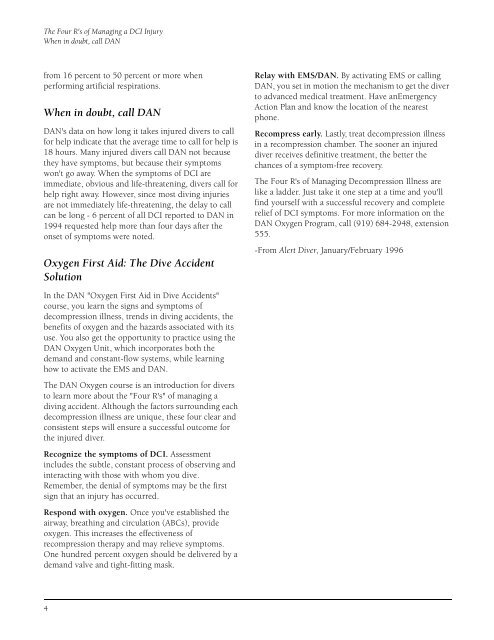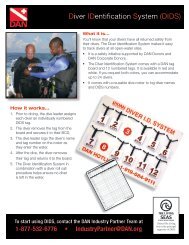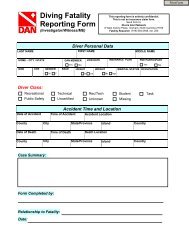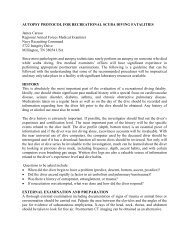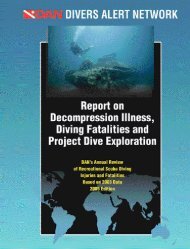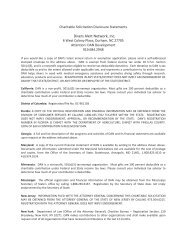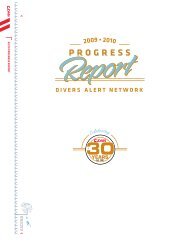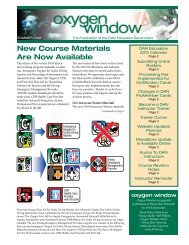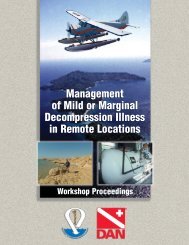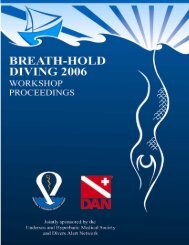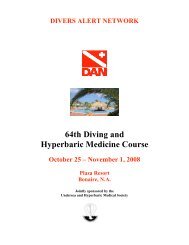The Four R's Of Managing A DCI Injury - Divers Alert Network
The Four R's Of Managing A DCI Injury - Divers Alert Network
The Four R's Of Managing A DCI Injury - Divers Alert Network
You also want an ePaper? Increase the reach of your titles
YUMPU automatically turns print PDFs into web optimized ePapers that Google loves.
<strong>The</strong> <strong>Four</strong> <strong>R's</strong> of <strong>Managing</strong> a <strong>DCI</strong> <strong>Injury</strong><br />
When in doubt, call DAN<br />
from 16 percent to 50 percent or more when<br />
performing artificial respirations.<br />
When in doubt, call DAN<br />
DAN's data on how long it takes injured divers to call<br />
for help indicate that the average time to call for help is<br />
18 hours. Many injured divers call DAN not because<br />
they have symptoms, but because their symptoms<br />
won't go away. When the symptoms of <strong>DCI</strong> are<br />
immediate, obvious and life-threatening, divers call for<br />
help right away. However, since most diving injuries<br />
are not immediately life-threatening, the delay to call<br />
can be long - 6 percent of all <strong>DCI</strong> reported to DAN in<br />
1994 requested help more than four days after the<br />
onset of symptoms were noted.<br />
Oxygen First Aid: <strong>The</strong> Dive Accident<br />
Solution<br />
Relay with EMS/DAN. By activating EMS or calling<br />
DAN, you set in motion the mechanism to get the diver<br />
to advanced medical treatment. Have anEmergency<br />
Action Plan and know the location of the nearest<br />
phone.<br />
Recompress early. Lastly, treat decompression illness<br />
in a recompression chamber. <strong>The</strong> sooner an injured<br />
diver receives definitive treatment, the better the<br />
chances of a symptom-free recovery.<br />
<strong>The</strong> <strong>Four</strong> <strong>R's</strong> of <strong>Managing</strong> Decompression Illness are<br />
like a ladder. Just take it one step at a time and you'll<br />
find yourself with a successful recovery and complete<br />
relief of <strong>DCI</strong> symptoms. For more information on the<br />
DAN Oxygen Program, call (919) 684-2948, extension<br />
555.<br />
-From <strong>Alert</strong> Diver, January/February 1996<br />
In the DAN "Oxygen First Aid in Dive Accidents"<br />
course, you learn the signs and symptoms of<br />
decompression illness, trends in diving accidents, the<br />
benefits of oxygen and the hazards associated with its<br />
use. You also get the opportunity to practice using the<br />
DAN Oxygen Unit, which incorporates both the<br />
demand and constant-flow systems, while learning<br />
how to activate the EMS and DAN.<br />
<strong>The</strong> DAN Oxygen course is an introduction for divers<br />
to learn more about the "<strong>Four</strong> <strong>R's</strong>" of managing a<br />
diving accident. Although the factors surrounding each<br />
decompression illness are unique, these four clear and<br />
consistent steps will ensure a successful outcome for<br />
the injured diver.<br />
Recognize the symptoms of <strong>DCI</strong>. Assessment<br />
includes the subtle, constant process of observing and<br />
interacting with those with whom you dive.<br />
Remember, the denial of symptoms may be the first<br />
sign that an injury has occurred.<br />
Respond with oxygen. Once you've established the<br />
airway, breathing and circulation (ABCs), provide<br />
oxygen. This increases the effectiveness of<br />
recompression therapy and may relieve symptoms.<br />
One hundred percent oxygen should be delivered by a<br />
demand valve and tight-fitting mask.<br />
4


